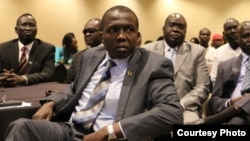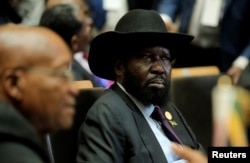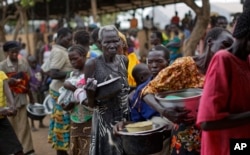The press secretary for South Sudan's Vice President James Wani Igga has resigned, saying he cannot serve a government that is subjecting its people to suffering.
David Mayen Dengdit told VOA's South Sudan in Focus that he left his position a week ago because of what he called bad government policies.
"I would be a hypocrite if I pretended to be serving two masters: A government that is sending its people away, that is subjecting its people to different forms of sufferings, and the same people who are victims of our government. I could not do both at the same time," said Dengdit, who is now in Denver, Colorado.
The government of President Salva Kiir has been fighting rebel groups since December 2013. The civil war has pushed an estimated 4 million South Sudanese from their homes and left at least 6 million in need of humanitarian assistance.
Office: Dengdit requested time off
Dengdit is a longtime associate of Igga. Dengdit began working for Igga in 2008, when the vice president was the speaker of the national legislative assembly in Juba.
Kalisto Lado, the deputy press secretary in the vice president's office, told VOA that Dengdit has not submitted a resignation letter.
"We were surprised to hear him talking to VOA that he has tendered his resignation," he said. "What we know is that he took some time off to visit his family in Kampala [Uganda] and his mother and sister in the U.S. He also requested some time off to seek medical attention.
"He was a good press secretary. ... We don't know the motives behind his resignation. We wish he had first consulted us before resigning."
War crime accusations
Dengdit said the government's counterinsurgency policy in parts of eastern Equatoria and Yei River states has pushed thousands of people from their ancestral lands.
Dengdit said he traveled recently to Uganda on a bus and witnessed ghost villages along the once-busy Juba-Nimule highway, which connects South Sudan with east African countries.
"I can attest to you that if a population census is conducted tomorrow, the Madi tribe would not be counted because they have all been pushed to refugee camps in Uganda," he said.
Kiir visited the South Sudanese border town of Nimule last month and apologized to residents whose villages were destroyed during a government campaign to fight rebels of the Sudan People's Liberation Army in Opposition in the area.
"I am sorry to see Lowa Pari in the shape I have seen this morning," Kiir told a small crowd of people who turned up at a trading center during his visit. "This was once a place where the population used to be active. Now it is vandalized; there is nothing there and I am sorry for that."
Dengdit said, "A skewed counterinsurgency strategy by the Kiir administration is responsible for the sufferings of civilians in South Sudan, for the war crimes that have been committed against the civilians in greater Equatoria, in greater Upper Nile."
He said the government practices a policy of blanket condemnation of civilians in villages across South Sudan.
"This is happening in Lainya [county]; this is happening to [the] Kakwa in Yei [state] and Morobo [county in Yei]. This is happening to [the] Kuku in Kajokeji [county]," the former press secretary said.
Pay issue
Dengdit also said he has not been paid since November.
When he was last paid, the money wasn't enough to cover basic costs, Dengdit said. "When your salary comes, it is not enough to provide you with water for 30 days. A barrel of water is now 200 South Sudanese pounds," (about $1.50), he said.
Kiir has acknowledged on several occasions that his government has no money to pay its soldiers and civil servants.
In March, Kiir told his new finance minister to devise ways to revitalize the collapsed country's economy.
Dengdit, however, maintained the country has money from oil revenues. "We are still exporting 150,000 barrels [of crude oil] per day even today. Where is that money going?"
He said South Sudan's capital, Juba, is crowded with women, men and street children begging from well-wishers.
"There is a total meltdown, there is a complete collapse of the economy, [and] people cannot make ends meet," Dengdit said.







